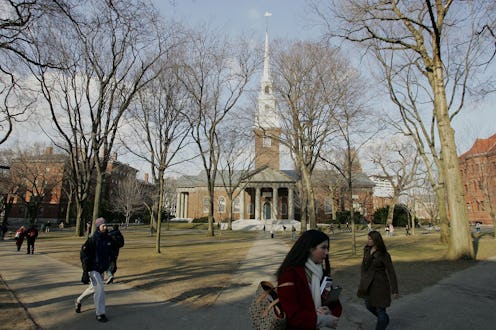News
Satanic Black Mass Shakes Up Harvard
Although 2014 is shaping up to be the year of "religious freedoms" for the Supreme Court, over at Harvard University, there are still clashes over which religious practices are protected. After vehement opposition from university student groups and Harvard administrators, the Harvard Extension School's Cultural Studies club canceled Harvard's re-enactment of a "black mass" scheduled for Monday. The event, allegedly planned for educational purposes only, had provoked outrage among religious organizations in the Greater Boston area.
Black masses originated as a mockery of the Catholic Church, taking the Church's tradition of the Mass, a sacrament that focuses on the transubstantiation of Jesus Christ, and re-imagining it with the devil. However, the ritual can take on many forms, and is not typically at the center of Satanism or the Church of Satan. On Monday evening, Harvard University President Drew Faust released a statement acknowledging that, while the university believes in the right to free expression, the black mass endangers the "civility" of the community.
The decision by a student club to sponsor an enactment of this ritual is abhorrent; it represents a fundamental affront to the values of inclusion, belonging and mutual respect that must define our community. ... Nevertheless, consistent with the University’s commitment to free expression, including expression that may deeply offend us, the decision to proceed is and will remain theirs.
Officials from the Harvard Extension School said that while they don't endorse the views of the event, they do "support the rights of our students and faculty to speak and assemble freely."
According to The Harvard Crimson, after initially canceling the event Monday afternoon, the group held the black mass that night on the second floor of Hong Kong Lounge, a Chinese restaurant located off-campus in Cambridge, Massachusetts. The Crimson reported about 50 people attended the event, which featured people dressed in hoods, as well as "a man in a white suit, a cape, and a horned mask."
Earlier in the day, the Cultural Studies club said in an email that The Middle East, a popular Cambridge venue, would host the black mass. However, the nightclub's general manager told The Crimson that negotiations with the Cultural Studies club had fallen through. Boston.com added that members of a New York-based satanic temple were helping the group perform the ceremony.
Anton LaVey, creator of the Church of Satan, wrote in The Satanic Bible:
A Black Mass is not the magical ceremony practiced by Satanists. The Satanist would only employ the use of a Black Mass as a form of psychodrama. Furthermore, a Black Mass does not necessarily imply that the performers of such are Satanists. A Black Mass is essentially a parody on the religious service of the Roman Catholic Church, but can be loosely applied to a satire on any religious ceremony.
LaVey goes on to argue that black masses are "nothing more than a redundancy" in modern times. However, the tradition does have deep roots stemming back to the Middle Ages, where parodies of Christianity abounded.
But because of the maligned history, the Archdiocese of Boston didn't take too kindly to the re-enactment. The archdiocese released an official statement on May 7 denouncing the black mass and calling for Harvard to disassociate itself from the event. Cardinal O'Malley added that he was "disappointed" in President Faust for not shutting down the event. The archdiocese's counter-event, the procession hour and benediction, went on as planned and received a strong attendance.
"We have no way to prevent [the black mass] other than to try and explain to people how evil this is," O'Malley told local media.
Catholic students also led much of the opposition. Members of the Harvard Catholic Student Association circulated an online petition demanding that the university speaks out against the event, while the Harvard Chaplains, a coalition that includes several different denominations, sent The Crimson a statement:
Just because something may be permissible does not make it right or good. Whether or not these students are ‘entitled’ to express themselves through the ceremony of a ‘black mass’ as a matter of law or University policy is a distinct question from whether this is a healthy form of intellectual discourse or community life. We submit it is not.
Satanism and freedom of expression have had a long history in America. Although most religions are protected under the First Amendment, Satanism has rarely received the same protection. It doesn't help that the Supreme Court has never defined what "religion" is, and many courts disagree that lesser-known belief systems, such as Satanism, fall under the religion umbrella.
However, as Harvard political ethicist Christopher Robichaud told Vox, barring events such as a black mass hinders discourse and critical reflection."When is it appropriate to reject a public activity solely on religious grounds in a pluralistic democracy where not everyone shares those grounds?" he asked.
That question has yet to be answered.
